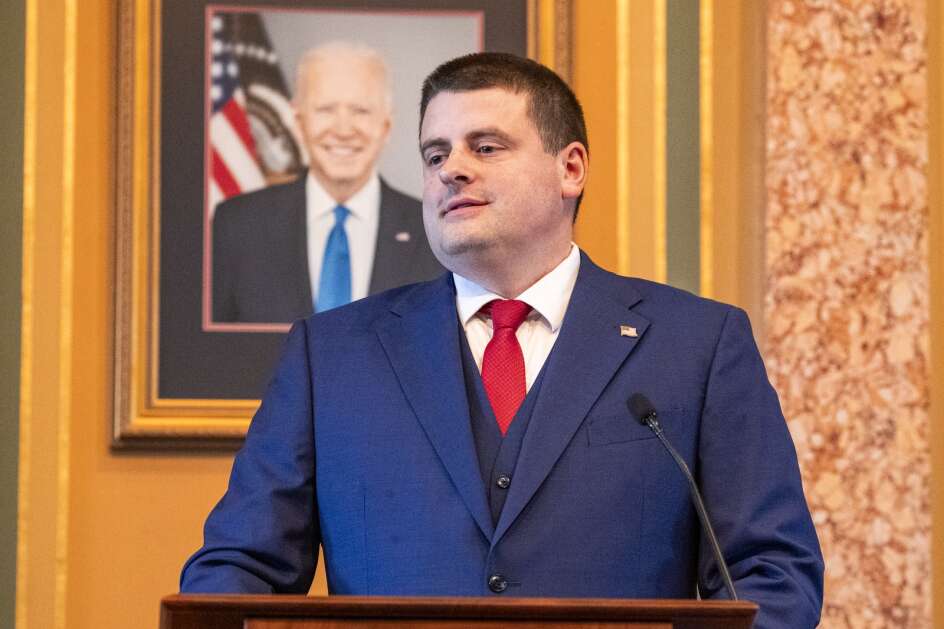The Gazette uses Instaread to provide audio versions of its articles. Some words might not be spoken correctly.
Despite a proposal from a state government efficiency panel, Republican House Speaker Pat Grassley and other statehouse leaders say they have no interest in exploring reforms to the state-run public employee retirement scheme.
Ahead of a deadline of September 29, the Iowa DOGE task force convened last week to deliberate on dozens of suggestions to submit to lawmakers and Governor Kim Reynolds. Replacing the Iowa Public Employees Retirement System (IPERS) with a defined contribution plan akin to a 401(k) was one of the 45 suggestions that were discussed.
According to Terry Lutz, a former mayor of Fort Dodge and chairman of McClure Engineering Co., Iowa’s health care and retirement compensation plans are completely out of step with the private sector. According to Lutz, the head of the Iowa DOGE task force return on investment work group, public employees in Iowa make around 30% of their state pension plan contributions, while the state makes 70%.
He stated during last week’s meeting that same percentages would be nearly the opposite in the private sector.
Suggested Reading
Iowa DOGE Task Force considers performance-based teacher pay, changes to county services
Additionally, he stated that state government employees have much lower health care deductibles than those in the private sector.
According to Lutz, the study group recommends eliminating the current defined benefits program and switching to a defined contribution structure, as so many other states have done, in order to address the significant liabilities that pension payments create for the state.
In order to further reduce costs for Iowa taxpayers, the work group also suggested that the state carry out an extensive investigation into the possibility of more closely matching the compensation of public employees with that of the private sector.
In a defined benefits plan, the employer oversees the investments and makes sure there are enough resources to cover the guaranteed retirement benefits, which are determined by the employee’s years of service and income.
The employee controls the investments and bears the risk under a defined contribution plan, such as a 401(k). Benefits at retirement are not guaranteed by defined contribution plans. Benefits are instead mostly determined by employee contributions and the performance of investments.
According to Lutz, if the changes are implemented, they will only affect new hires and will not affect current public employees who are currently contributing to IPERS.
Public unions have criticized the prospect, and the proposal has encountered bipartisan opposition.
According to a social media post by AFSCME Local 61 staff, this proposal would take away the retirement security that public employees have accrued over decades of service.
Approximately 10% of Iowans depend on IPERS for a portion of their retirement income. The IPERS Trust Fund, which has an approximate value of $43 billion, paid out $2.6 billion in benefits annually during the fiscal year that concluded on June 30, 2024, with investment income accounting for 70% of these payments.
With almost 400,000 members, including current, past, and retired employees of the state, cities, counties, and school districts, IPERS was established in 1953 with the goal of luring and keeping talented public servants.
“Iowans anticipate that we will continue to improve the effectiveness of government. According to a statement from Iowa House Speaker Pat Grassley, R-New Hartford, “I want to reassure Iowans that I have no interest in making changes to IPERS, even though I recognize their concerns.” We’ll keep looking for further ways to reduce waste and make sure Iowans can get the most out of their government.”
In a similar vein, Jack Whitver, a Republican and the majority leader of the Iowa Senate, stated that he does not see the notion gaining traction during the 2026 legislative session.
The DOGE Task Force’s goal is to get people, primarily from outside the public sector, to examine government and search for methods to make it more effective. In a statement, Whitver said. The topics covered in these sessions are merely ideas; they are not bills or legislative proposals. Anyone claiming that significant changes are occurring to public retirement systems is disseminating false information and deceiving Iowans; there is no legislative plan. I do not anticipate changes to this system, and no caucus members have approached me requesting changes to IPERS while we are still awaiting a final proposal from the DOGE task committee.
In February, Governor Kim Reynolds issued an executive order creating the Iowa DOGE task team. The committee, which consists of 15 corporate and industry executives from throughout the state, is charged with identifying ways to improve the efficiency of the state government and generating suggestions for Reynolds and lawmakers to take into account.
The federal Department of Government Efficiency, which was established by President Donald Trump and was previously led by tech entrepreneur Elon Musk, has a similar name to the task force.
Requests for comment were sent to task force chair Emily Schmitt, general counsel and chief administrative officer of Sukup Manufacturing, by a Reynolds office spokesperson.
According to Schmitt, the task force is currently putting together its final report for the governor’s review, and among the 45 suggestions that are “preliminary and have yet to be finalized” are discussions of potential modifications to IPERS.
The next meeting of the Iowa DOGE Task Force is scheduled for September 15. It is anticipated that Gov. Reynolds will get the final recommendations by September 29.
In order to investigate the possibility of closer alignment with private sector benefit offerings and to further cost-saving strategies for Iowa taxpayers, the return on investment work group decided to undertake a thorough study of the state’s retirement and health benefits systems, Schmitt said in a statement to The Gazette. In order to guarantee that current employees would not be impacted by any future changes to IPERS, the task force’s remarks also mentioned an exemption for current public employees who pay into IPERS.
Democratic gubernatorial candidate Rob Sand, the state auditor, told reporters on Wednesday that the task group should abandon its proposal to alter the public employee pension system.
Sand told reporters covering one of his appearances at the Iowa State Fair, “Look, these are teachers, they’re firefighters, they’re plow drivers, they’re police officers.” We have an agreement with them, and in my opinion, if you make a deal, you have to follow through on it.
Sand bemoaned the absence of concrete plans to increase public employees’ remuneration, claiming that many have taken lower salaries in exchange for improved pensions.
They’re thinking, “Oh, these are generous pensions, but their paychecks are lower,” which is a significant aspect of this that I believe everyone is ignoring, Sand added.
According to a 2011 report by the Iowa Policy Project, public sector employees in Iowa still make less money than their private sector counterparts, even after accounting for benefit packages.
Therefore, this is not an efficiency matter in my opinion. According to Sand, it merely wants to target public employees. However, how will we motivate individuals to perform the task that taxpayers require of them if you tell them, “Okay, this is a low wage job and there is not much of a pension?”
Union reps: Cuts would hurt ability to attract, retain workers
In an interview, Todd Copley, president of AFSCME Council 61, which advocates for Iowa’s public sector employees, stated that the state’s current public retirement system serves as an example of cost-effectiveness and efficiency for other states.
As of December, IPERS was more than 90% funded, which means that, in comparison to most states, the plan has 90 cents in assets for every dollar of lifetime income benefits given to retirees.
In FY2024, the IPERS investment program generated a 9 percent return, above its 7 percent forecast. The actuarial gain from the better-than-expected performance was $245 million.
According to Copley, altering the system would undermine efforts at hiring and retaining staff, which would lead to a scarcity of workers in a variety of industries, including as reaching, law enforcement, and corrections.
He claimed that the reward of a comfortable, secure retirement is the one thing that motivates individuals to labor for. Do you wish to remove that right away?
Reynolds told reporters during her 2018 campaign for her first full term as governor that she would maintain IPERS solvent and “honor the commitments that have been made,” labeling assertions to the contrary a scare tactic, as noted by Copley and Iowa Democrats.
Copley stated that he was still wary of the possibility that GOP lawmakers would not alter IPERS.
“When they say that, I hope they mean it,” he remarked. However, we have often heard identical statements from Republicans in the House and Senate. We learned in 2017 that the rights of public employees to collective bargaining will be modified. Well, we all seen how that tragically ended. And basically, public employees have lost all rights whatsoever as far as to negotiate a contract.
Melissa Peterson, a lobbyist for the Iowa State Education Association, said moving to a defined contribution system for incoming employees would make the current IPERS system unsustainable.
It sounded like the recommendation was to essentially grandfather in everyone who’s currently under the defined benefit system, Peterson said. The problem is, if you don’t have new employees contributing to that defined benefit system, that reduces the benefit for those that are already in the program. So moving to a defined contribution is not only incredibly expensive, it also has a direct adverse impact on our ability to retain and recruit quality education professionals and all public employees for that matter.
Peterson also criticized a preliminary task force recommendation that would base K-12 teacher compensation on student outcomes.
She said pay-for-performance does not account for differences in grade levels, content areas or individual student needs, and did not result in improved student outcomes or enhanced teacher collaboration when tried in Iowa or other states.
Democrats: Cuts would be devastating blow to economy, workforce
Iowa House Minority Leader Brian Meyer, D-Des Moines, said in a statement eliminating IPERS and other public pensions would be a devastating blow to Iowa s workforce and economy.
“For decades, these pensions have provided a secure retirement for public servants, including teachers, police officers, firefighters, nurses and social workers, who dedicate their lives to serving our communities, Meyer said. Gutting this system would break yet another promise to workers and further damage Iowa s already struggling economy, which is ranked dead last in the nation.”
Senate Minority Leader Janice Weiner, D-Iowa City, said in a statement public servants deserve to have security in their retirement planning.
Like other public employee pension programs, it is a critical workforce recruitment and retention tool, Weiner said. Brain drain among younger Iowans presents a significant obstacle as we work to turn around our shrinking economy. To grow our workforce, we must make the prospect of living, working and retiring in Iowa more attractive. The task force s recommendations, especially with regard to public employee benefits and compensation, and with no input from those public servants, do the opposite.
Lee Des Moines Bureau Chief Maya Marchel Hoff contributed to this report.
Comments: (319) 398-8499; [email protected]






